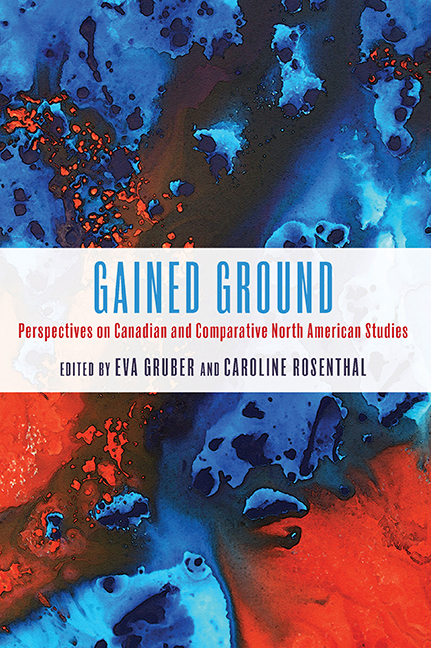Book contents
- Frontmatter
- Contents
- Preface and Acknowledgments
- Introduction
- Part I The Genesis of Canadian and Comparative North American Studies
- Part II Comparative North American Studies: Literary Case Studies
- “Poetics of the Potent”: Yann Martel's Life of Pi, Edgar Allan Poe's The Narrative of Arthur Gordon Pym of Nantucket, and Modes of Transcreation
- “Wanting to Light out for Tender Tenantless Territories”: Reading Landscape in Robert Kroetsch's The Hornbooks of Rita K (2001) and Mark Anthony Jarman's 19 Knives (2000)
- “Landscape–of–the–Heart”: Transgenerational Memory and Relationality in Roy Kiyooka's Mothertalk: Life Stories of Mary Kiyoshi Kiyooka
- Performing Shame: Theatrical Motifs in the Works of Alice Munro and Alison Bechdel
- Timothy Findley's “Stones”: Names, Symbols, and Stories
- Part III Comparative North American Studies beyond Print
- Part IV Coda: Reingard Nischik and Transatlantic Canadian Criticism
- Index
“Wanting to Light out for Tender Tenantless Territories”: Reading Landscape in Robert Kroetsch's The Hornbooks of Rita K (2001) and Mark Anthony Jarman's 19 Knives (2000)
from Part II - Comparative North American Studies: Literary Case Studies
Published online by Cambridge University Press: 26 October 2019
- Frontmatter
- Contents
- Preface and Acknowledgments
- Introduction
- Part I The Genesis of Canadian and Comparative North American Studies
- Part II Comparative North American Studies: Literary Case Studies
- “Poetics of the Potent”: Yann Martel's Life of Pi, Edgar Allan Poe's The Narrative of Arthur Gordon Pym of Nantucket, and Modes of Transcreation
- “Wanting to Light out for Tender Tenantless Territories”: Reading Landscape in Robert Kroetsch's The Hornbooks of Rita K (2001) and Mark Anthony Jarman's 19 Knives (2000)
- “Landscape–of–the–Heart”: Transgenerational Memory and Relationality in Roy Kiyooka's Mothertalk: Life Stories of Mary Kiyoshi Kiyooka
- Performing Shame: Theatrical Motifs in the Works of Alice Munro and Alison Bechdel
- Timothy Findley's “Stones”: Names, Symbols, and Stories
- Part III Comparative North American Studies beyond Print
- Part IV Coda: Reingard Nischik and Transatlantic Canadian Criticism
- Index
Summary
The endless task of the Canadian writer is to invent a place in the place of Canadian geography. “In the place of,” here becomes the dislocating pun, the pun that riddles Canadian writing.
Landscape is a question of appalling weight in Canadian writing, partly because there is in Canada so much landscape, with no accepted tradition, no code, if you will, for its being read. Or perhaps, because of that, there is no landscape in Canada, no way to translate “scrubby trees, picturesque / bedrock, ample weather and sunsets” into landscape.
—Robert Kroetsch, “Reading Across the Border”ONE RECURRING CONCERN in Robert Kroetsch's writing is the impossibilities that arise when trying to envision Canadian geography in terms of landscape while relying upon the vocabulary, the aesthetic and generic protocols that European empires deployed to take visual possession of the world from the Renaissance onwards (Cosgrove 1985, 55; Mitchell 2002, 5–34). From the interrogations that inform his long poem Seed Catalogue (1977) to his later collections of essays and poetry—most notably A Likely Story (1995) and The Hornbooks of Rita K (2001)— Kroetsch insisted on viewing the translation of land into landscape not as a foretold failure but as an imperative for the Canadian writer whose collective responsibility lies in lifting a new environment to expression. Embracing this task also led him to play an active part as a writer and critic inventing a place for Canadian letters at home and abroad. Kroetsch was one of the early ambassadors of Canadian literature in Europe, where his meeting with Reingard Nischik led to the publication of Gaining Ground in 1985. A landmark volume, the collection of essays was the first of its kind to map out the emergence of Canadian literature and legitimate it as a field of scholarly investigation in Western Europe. Gaining Ground made it clear that the literary boom of the Centennial decade of the 1960s had found a critical reception abroad, which also conferred on Canadian literature a legitimate place in the syllabi of European universities.
- Type
- Chapter
- Information
- Gained GroundPerspectives on Canadian and Comparative North American Studies, pp. 76 - 92Publisher: Boydell & BrewerPrint publication year: 2018
- 1
- Cited by

